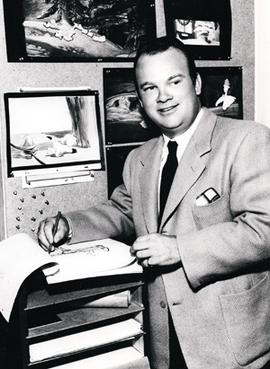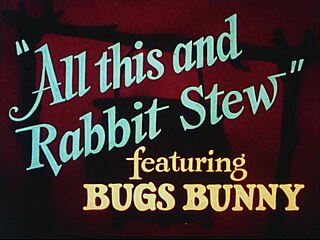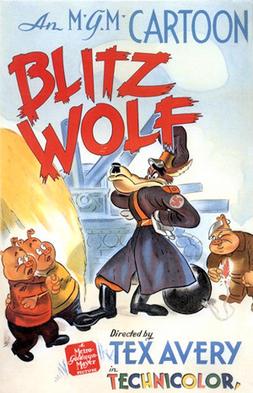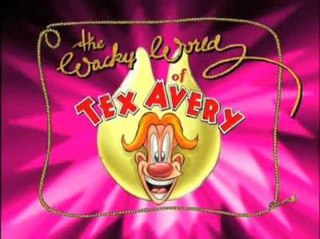Related Research Articles

Frederick Bean "Tex" Avery was an American animator, cartoonist, director, and voice actor. He was known for directing and producing animated cartoons during the golden age of American animation. His most significant work was for the Warner Bros. and Metro-Goldwyn-Mayer studios, where he was crucial in the creation and evolution of famous animated characters such as Bugs Bunny, Daffy Duck, Porky Pig, Elmer Fudd, Droopy, Screwy Squirrel, The Wolf, Red Hot Riding Hood, and George and Junior.

Walter Lantz Productions was an American animation studio that was active from 1928 to 1949 and then from 1950 to 1972. It was the principal supplier of animation for Universal Pictures.

Droopy is an animated character from the golden age of American animation. He is an anthropomorphic white Basset Hound with a droopy face. He was created in 1943 by Tex Avery for theatrical cartoon shorts produced by the Metro-Goldwyn-Mayer cartoon studio. Essentially the polar opposite of Avery's other MGM character, the loud and wacky Screwy Squirrel, Droopy moves slowly and lethargically, speaks in a jowly monotone voice, and—though hardly an imposing character—is shrewd enough to outwit his enemies. When finally roused to anger, often by a bad guy laughing heartily at him, Droopy is capable of beating adversaries many times his size with a comical thrashing.

Red Hot Riding Hood, also known as Red and Miss Vavoom in the 1990s, is an American animated character, created by Tex Avery, who appears in several MGM short films and Tom and Jerry films. She is a fictional nightclub singer and dancer who usually makes all men in the room crazy, especially a Wolf character who—in vain—tries to seduce and chase her. Red debuted in MGM's Red Hot Riding Hood, a modern-day variant of the fairy tale "Little Red Riding Hood".

Red Hot Riding Hood is an animated cartoon short subject, directed by Tex Avery and released with the movie Dr. Gillespie's Criminal Case on May 8, 1943, by Metro-Goldwyn-Mayer. In 1994, it was voted number 7 of The 50 Greatest Cartoons of all time by members of the animation field, making it the highest ranked MGM cartoon on the list. It is one of Avery's most popular cartoons, inspiring several of his own "sequel" shorts as well as influencing other cartoons and feature films for years afterward.

The Heckling Hare is a Merrie Melodies cartoon, released on July 5, 1941, and featuring Bugs Bunny and a dopey dog named Willoughby. The cartoon was directed by Tex Avery, written by Michael Maltese, animated by soon-to-be director Robert McKimson, and with musical direction by Carl W. Stalling. In a style that was becoming typical of the Bugs character, he easily outwitted and tormented his antagonist through the short, his only concern being what to do next to the dog.

The Tex Avery Show is an American animated showcase series of Metro-Goldwyn-Mayer and Warner Bros. cartoon shorts prominently by animator Tex Avery. In between the shorts, Don Kennedy gives short facts about the cartoons. The showcase premiered on the Cartoon Network in 1996, and was taken off the air in 2002, while reruns continued to be shown on Cartoon Network until April 11, 2004. It was soon re-broadcast on Boomerang. Some cartoons, like 1947's Uncle Tom's Cabaña, were omitted from the package as they were deemed offensive to some audiences.

All This and Rabbit Stew is a 1941 Merrie Melodies cartoon directed by Tex Avery. The cartoon was released on September 13, 1941, and features Bugs Bunny.
Robert Cameron Bruce Jr. was an American voice actor and the son of Robert Cameron Bruce (1887–1948) who was a cinematographer and documentary producer. He was the narrator for a number of Warner Bros. cartoons in the 1930s and 1940s. The Looney Tunes and Merrie Melodies series' had occasional entries which were driven not by one of their stable of stars such as Bugs Bunny or Daffy Duck, but by individual short sketches, usually filled with sight gags and word-play. Later he was a writer and producer of industrial motion pictures based in Minnesota.

The Metro-Goldwyn-Mayer cartoon studio was an American animation studio operated by Metro-Goldwyn-Mayer (MGM) during the Golden Age of American animation. Active from 1937 until 1957, the studio was responsible for producing animated shorts to accompany MGM feature films in Loew's Theaters, which included popular cartoon characters Tom, Jerry, Droopy, Butch, Spike, Tyke, and Barney Bear.

Blitz Wolf is a 1942 American animated propaganda short film produced and distributed by Metro-Goldwyn-Mayer. A parody of the Three Little Pigs told via a World War II perspective, the short was directed by Tex Avery and produced by Fred Quimby. It was nominated for the Academy Award for Best Short Subject: Cartoons but lost to Der Fuehrer's Face, another anti-Nazi World War II parody featuring Donald Duck.

The Wacky World of Tex Avery is an animated television series created by Robby London and co-produced by DIC Productions, L.P., Les Studios Tex SARL, Milimetros, M6 and Telcima.
The House of Tomorrow is a 1949 animated theatrical short directed by Tex Avery. It was part of a series of cartoons Avery did satirizing technology of the future which included: The Car of Tomorrow, The T.V. of Tomorrow, and The Farm of Tomorrow. These were spoofs of live-action promotional films that were commonly shown in theaters at the time.

Northwest Hounded Police is a 1946 American animated short film directed by Tex Avery, produced by Fred Quimby, and featuring Droopy and Avery's wolf character. A remake of Droopy's first cartoon Dumb-Hounded, the short revolves around the wolf on the run from Droopy, who is trailing the wolf in order to capture him. The title is a play on words on the film North West Mounted Police (1940).
The Farm of Tomorrow is a 1954 one-reel animated short subject directed by Tex Avery and produced by Fred Quimby. It was released theatrically with the feature filmmovie Rogue Cop on 18 September 1954 and distributed by Metro-Goldwyn-Mayer.

The Screwy Truant is a 1945 Screwy Squirrel cartoon directed by Tex Avery and released by MGM.

Uncle Tom's Cabaña is a 1947 American animated short film directed by Tex Avery. The short is a parody of Harriet Beecher Stowe's 1852 novel Uncle Tom's Cabin, and is Avery's second parody of the novel, the first being Uncle Tom's Bungalow in 1937 while at Warner Bros. Cartoons.
What's Buzzin' Buzzard? is a 1943 American animated short film directed by Tex Avery, produced by Fred Quimby, and musical score by Scott Bradley. The short pokes fun at the food shortages common at the time. The plot focuses on two turkey vultures struggling to find food in the desert. It was released to theaters on November 27, 1943 by Metro-Goldwyn-Mayer. Producer Fred Quimby disliked the cartoon but was surprised when it was put under the preservation in the Library of Congress. It is currently available on the Tex Avery Screwball Classics: Volume 1 Blu-Ray. The cartoon during production was under the title "Vulture A La King".
Cellbound is a 1955 cartoon short featuring Spike and directed by Tex Avery and Michael Lah. The story was by Heck Allen, and Paul Frees voiced all the characters. Its title is a pun on "spellbound."
Tex Avery Screwball Classics is a series of single-disc Blu-ray and DVD sets by Warner Bros. Home Entertainment's Warner Archive unit collecting various theatrical cartoons from animation director Tex Avery during his tenure at the Metro-Goldwyn-Mayer studio's cartoon division between the years of 1942 and 1955. It is the first comprehensive collection of Avery's MGM shorts to be released on home media in North America since The Compleat Tex Avery series of laserdiscs in the 1990s, with many of the shorts having been previously unreleased on DVD or Blu-ray.
References
- ↑ "AVERY…. Vol. 2??? WELL, IMAGINE THAT! -". cartoonresearch.com. December 7, 2020. Retrieved December 15, 2020.
- ↑ Lenburg, Jeff (1999). The Encyclopedia of Animated Cartoons. Checkmark Books. pp. 146–147. ISBN 0-8160-3831-7.
- ↑ Telotte, J. P. (2018). Animating the Science Fiction Imagination. p. 117 – via Google Books.
- ↑ "T.V. of Tomorrow (S)". FilmAffinity. Retrieved June 26, 2023.
- ↑ Cartoon Carnival: A Critical Guide to the Best Cartoons from Warner Brothers, MGM, Walter Lantz and DePatie-Freleng - Google Books (section "1953")